If you’ve worked in search engine optimization (SEO) for any time, you’ve likely received or sent some awful SEO reports.
Ya know the kind. Data dumps. A 10-page thesis long on KPIs, “SEO metrics,” and “we moved up three spots for <insert arbitrary keyword that drives zero new customers to business>.”
Waste. Of. Time.
The truth: most SEO reports aren’t worth the time it took to automate them; they’re just a collection of cherry-picked stats that make the SEO expert look like they’re doing their job.
Everyone loses.
A sound SEO report requires more than just data; it requires analysis, action items, and goals.
But to do that, first you need a sound SEO reporting tool that will make relevant data more accessible and digestible. Without comprehensible inputs, you’ll never get comprehensible outputs.
In this article, we’re going to explore both: the underpinnings of a sound SEO report as well as the SEO reporting tools that will help you craft one.
Dive into the world of SEO reporting and elevate your SEO performance with detailed reports, effective rank tracking, and beneficial SEO insights. Discover how to enhance your SEO campaigns, monitor your online presence, and track organic search progress using popular tools like Google Ads, Google My Business, and Google Sheets.
Whether you’re an SEO agency, in-house SEO expert, local SEO expert, or low-budget SEO expert, we’ve got a tool for you.
- Reporting tool vs. SEO tool
- What should an SEO report include?
- What should an SEO reporting tool include?
- The best SEO reporting tools for every use case
- Free SEO reporting tools
- SEO reporting tools for agencies
- SEO reporting tools for in-house teams
- SEO Reporting tools for local SEO
- SEO reporting tools for aggregating data
- Time to pick a tool
Get brand new SEO strategies straight to your inbox every week. 23,739 people already are!Sign Me Up
Reporting tool vs. SEO tool
There’s keyword research tools, generic SEO tools, technical SEO audit tools, backlink tools, and SEO reporting tools. Sometimes they’re all wrapped into one comprehensive tool, but not always.
The difference between an SEO reporting tool and a standard SEO tool (e.g. keyword research tool) is that a comprehensive reporting tool is specifically designed to produce critical reports about the health of your SEO over time, not just provide tools for research and SEO strategy.
Custom SEO reports provide a baseline for communicating critical factors about your organic search efforts to clients and colleagues. Most importantly, they help you diagnose critical issues and benchmark results so you can measure progress (or regress) long term.
What should an SEO report include?
Ironically, most reports that the average SEO sends to a client or colleague aren’t reports at all; they’re data dumps—a dashboard of numbers and charts with very little analysis, explanation or recommendations.
Avoid data dumps at all costs. They don’t help anyone.
Data can only tell you what is happening. It can’t tell you why it’s happening. Every SEO report worth its salt should explore the why behind the data. At a minimum, it should answer the following four questions:
- What progress/regress have we made?
- What changes or initiatives caused that progress/regress?
- Based on the data, what should we do next?
- If we do that next, what goal will this activity help achieve?
What data points you include in your SEO report to help you communicate those questions and answers will vary depending on who is asking for the report. Though you can usually get there with a combination of the following:
- Rank tracking: historical data showing ranking improvements or declines
- Click-through rates (CTR): the amount of searchers who saw your snippet and clicked on it
- Search volume trends: if a keyword is gaining or losing interest
- Traffic: not just organic traffic, but referral traffic (backlinks) or branded direct traffic too
- Backlink reports: quantity and quality of backlinks acquired in a given time frame, won/lost links, domain authority
- Site audit reports: on-page, technical SEO, etc.
- Engagement metrics: bounce rate, exit rate, time on site, pages per visit
- Historical data: how it compares to different time periods
- Goal completions: how many organic visitors converted
- User experience UX: core web vitals, mobile friendliness, HTTPS, page speed
- Analysis: what all of this means
- Roadmap: in response to the data, the action items to pursue next
- Goals: what concrete objectives we will achieve if we successfully execute action items
What should an SEO reporting tool include?
Optimally, an SEO reporting tool should make it easy to gather and visualize the data we mentioned above, allowing you to derive actionable insights from your SEO efforts.
But depending on your situation, the perfect SEO reporting software will vary.
Is it local SEO or international SEO? eCommerce? Internal communication or a client? Are you an agency or in-house SEO team? Enterprise or small business? Big budget or small budget?
For example:
- Low budget: collect data from Google Search Console and analytics that you can piece together in your own report
- In-house SEO: comprehensive SEO tool with custom reporting (no white labeling need)
- Enterprise features: tools that allow you to integrate dozens of third-party data sources and visualize it in one dashboard
- Marketing agency features: white-labeled client reporting, automation of reports, multiple users, easy client sharing, unlimited clients, social media data, content marketing reports, Google ads (if they provide SEM)
- Local SEO features: business listing reports (citations), Google My Business, review reporting
In essence, the right SEO reporting software should align with your specific needs, address any technical issues you encounter, empower you to monitor search volume and organic keywords effectively, and ultimately enhance your marketing strategy, regardless of your budget or operational scale.
The best SEO reporting tools for every use case
Now that you know what an SEO report and reporting tool should include, let’s explore our favorite tools for every use case.
- Free SEO reporting tools
- SEO reporting tools for agencies
- SEO reporting tools for in-house teams
- SEO reporting tools for local SEO
- SEO reporting tools for aggregating data
Let’s explore.
Free SEO reporting tools
For when data is critical but budget is low (aka when you’re “ballin on a budget”). With these three Google reporting tools, you’ll get everything you need to make informed decisions about your SEO, sans the price tag.
- Google Search Console
- Google Analytics
- Google Data Studio
Google Search Console

Google Search Console (formerly Webmaster Tools) is Google’s free suite of SEO reports available to every website owner who registers for an account. Though not the perfect all-in-one SEO reporting tool (GSC isn’t an SEO tool per se), since Google is, well, Google, they provide a few critical data points you can’t find anywhere else, like page experience stats.
What we love: Page Experience Report
The Page Experience Report is Google’s newest addition to Search Console (Nov 2021), and it measures user experience signals like mobile friendliness, website security (HTTPS), and Core Web Vitals (loading speed, interactivity, visual stability) all in one place.

Over the last decade, user experience SEO has grown more important to Google and search engine rankings. Today, if your site doesn’t adhere to the list of user experience signals Google uses as ranking factors, you’re not going to rank higher than those that do.
The Page Experience Report will break down any issues Google finds with your experience, along with instructions on how to fix them.
Honorable mention: Search Performance Report, Crawl Stats Report
- Search Performance Report: report on keywords, rankings, impressions, click-through rates, and organic traffic, all in one view
- Craw Stats Report: report which pages (if any) Google has issues crawling and indexing, or report on successful fixes you made
Google Analytics

Google Analytics
Google Analytics offers a treasure-trove of free and useful SEO data points. It’s the only free tool that provides such thorough data about traffic sources, visitor behavior, and conversions. Though Google Analytics can’t tell you why certain things happen (that’s up to you to figure out), it can uncover a litany of valuable insights that tell you what is happening. Bottom line: no SEO report is complete without data from Google Analytics.
What we love: conversion goals
Honestly, pretty much every report inside Google Analytics offers value for an SEO, but our favorite is conversion goals. Why? Because every SEO report worth its salt needs to communicate a tangible business value (ahem, revenue) to a client or executive, and tracking goal completions is the easiest way to show how organic traffic leads to new customers.

Honorable mention: engagement reports
Want to report on the level of organic traffic engagement? Look at time on site, bounce rate, pages per visit, and exit rate.
Google Data Studio

Google Data Studio is a data visualization tool that allows you to pull data from multiple sources (not just Google Analytics) into a beautifully designed visual dashboard. Unlike screenshots from Google Analytics, Data Studio makes reports easy to read, understand and share with colleagues or clients. And it’s totally free.
What we love: integrations
Data Studio allows you to import data from any source you want, whether that be an SEO tool (Ahrefs or SEMrush), Google Analytics or Search Console, a .CSV file, or more advanced BigQuery, MySQL, or PostgreSQL databases. Easily report all of your core SEO KPIs from one neat dashboard.

Honorable mention: templates
Easily create the perfect report in a matter of clicks. Just browse their template library, select the one you want, and voilà.

And don’t forget to browse the many ways other Google platforms can assist you with SEO reporting. (Hint: explore the features that make Google Ads, Google My Business, and Google Sheetsl popular tools for streamlining search engine optimization efforts!)
SEO reporting tools for agencies
For when a full suite of features matters just as much as white-labeled, automated reports and easy client communication. Because… clients.
- AgencyAnalytics
- SE Rankings
- SEO PowerSuite
AgencyAnalytics

AgencyAnalytics not only provides seamless SEO reports that include rankings, backlinks and website analytics, but it functions as a communication hub between you and your clients: give clients access to reports, communicate directly through the platform, or update clients on progress.
What we love: automated reports
A good SEO report should include thoughtful SEO analysis and recommendations, along with action items and milestones. That actual data visualization and collection can and should be automated (unless you want to waste a ton of time). With AgencyAnalytics, you can do both: add your own thoughts and recommendations, and automate the data part.

Honorable mention: white-labeled (customization)
Logo, brand colors, custom URL, app… let your clients login to a professional reporting dashboard that looks and feels like your own proprietary software.
Pricing: starting at $15/month.
SE Rankings

SE Rankings also offers white-labeled client dashboards, automated reports, position tracking, and competitor analysis, though they have a few extra features that you may find useful, like their page changes monitoring and an easy drag-and-drop user interface.
What we love: page changes reporting
SE Rankings monitors a website for changes (content, meta tags, robots.txt, index status, links), then timestamps those changes so you can see what changes influenced rankings, for better or worse. Bonus: you can even report those changes in a customer report so clients can see exactly what work you performed and how it helped.

Honorable mention: drag-and-drop user interface
Easily drag and drop modules you want to display in reports, like rankings, competitor analysis, traffic, finance report, website audit, or marketing plan.

Pricing: starting at $71/month.
SEO Powersuite
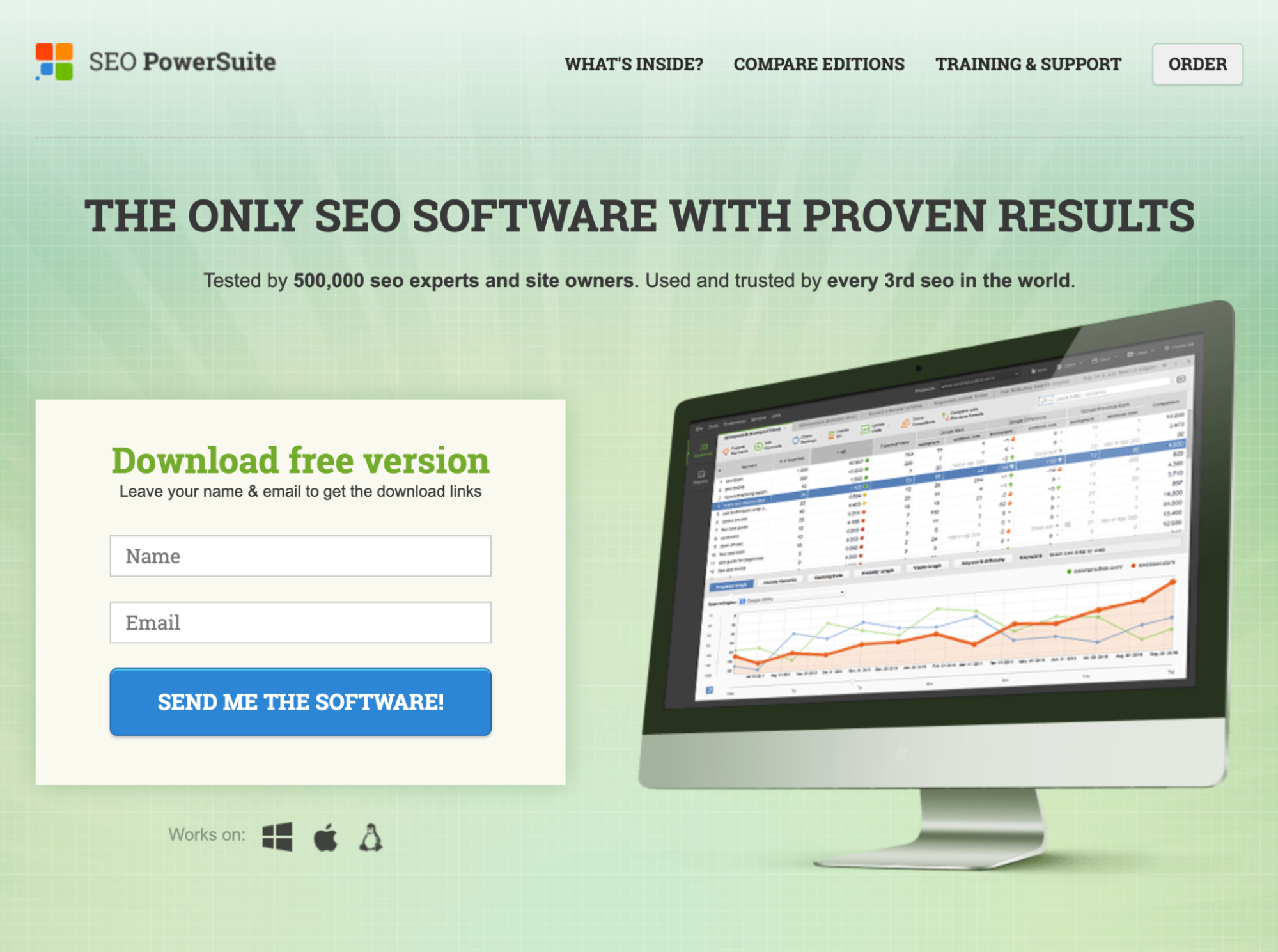
With over 2M users all time, SEO Powersuite has grown into a time-tested legend of the SEO community. Most recently, the reporting tool launched one of the most robust website auditing features in the industry. SEO Powersuite offers the same core features as SE Ranking and AgencyAnalytics (white label reporting, automated reports, backlinks, ranking positions, etc.), with a slightly different revenue model: annual payments with unlimited clients.
What we love: unlimited clients
Yes, seriously. For one flat rate (annual), you can monitor as many client websites as you want. There’s no limits on clients, keywords tracked, backlinks, pages or reports. Great for agencies with a lot of clients.
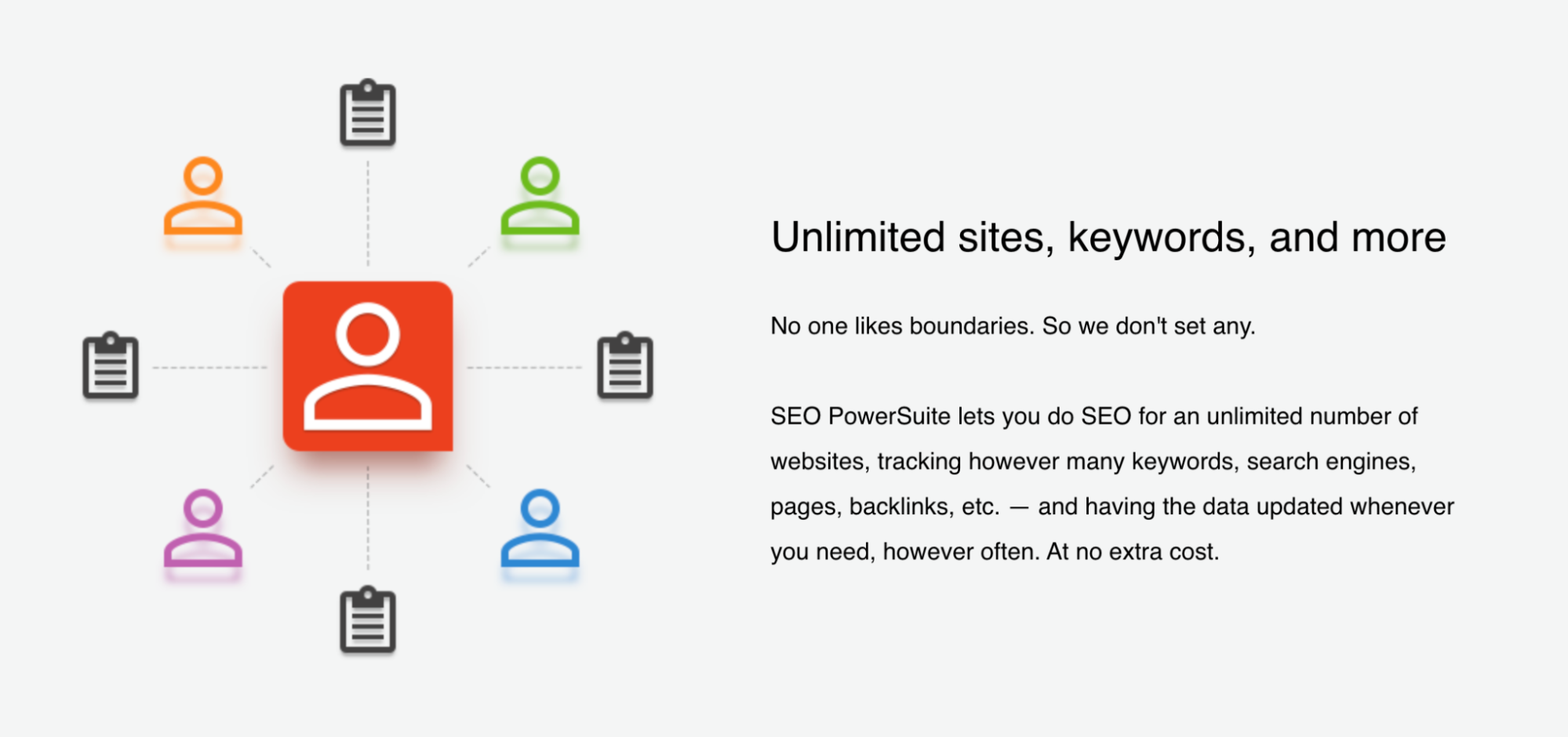
Honorable mention: Task scheduler
Schedule routine tasks like SEO audits or keyword ranking monitoring or reports for certain times and days so you don’t forget. Then come back and check when it’s convenient for you.
Pricing: $699/year (free version available)
SEO reporting tools for in-house teams
For when white-label reporting and automated reports matter less than the robustness of real-time data and useful features. To be honest, any one of these tools will work just as magnificent for clients as the aforementioned, but given the depth and breadth of reports included (many of which won’t interest clients), these SEO tools make for the perfect in-house reporting solution.
- SEMRush
- Ahrefs
- Moz Pro
SEMRush

SEMRush is one of the SEO industry's favorite tools. Of all time.
Though they do offer white-labeled, fully branded reporting, the power of SEMRush lies in the abundance of useful features. SEMRush makes reporting on virtually every aspect of SEO incredibly easy, from featured snippet monitoring to backlink monitoring. (Note: according to ScreamingFrog, SEMRush website traffic estimator might not be the best.)
What we love: Position Tracking Tool
Track rankings and movement over time, see a side-by-side view of your competitors rankings, see how you fare on mobile vs. desktop or in different regions of the world, and monitor which keywords include featured snippets. It's a standard position tracker, but on steroids.
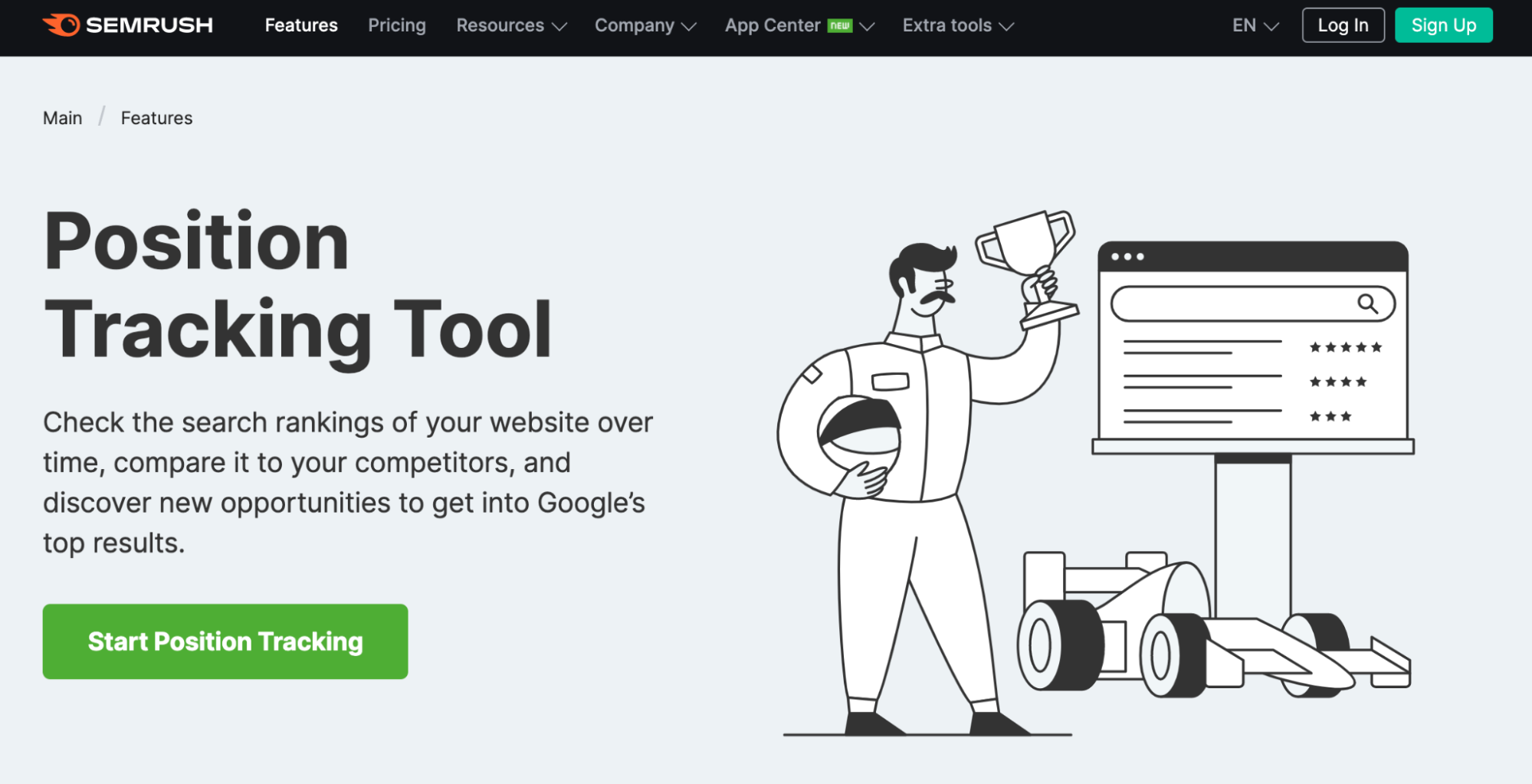
Honorable mention: Sensor
Sensor monitors daily changes in SERPs for specific industries so you can monitor the volatility of certain queries (as some industries and queries feel the effects of a Google update more often and more severe than others).
Pricing: starting at $120/month.
Ahrefs

Another staple of the SEO industry, Ahrefs brings a similar suite of tools and reports as SEMRush, along with the longest lineup of free tools available. They also have an enterprise option that ensures everyone in the marketing department, from content marketers to technical SEOs, get the right report for their job.
What we love: filters
Create an endless amount of specific reports using Ahrefs massive list of filters. For example, you can filter to report on low competition keywords, broken links on your website, mentions of your website that don't include links, high-traffic opportunities, websites that send the most referral traffic, and so much more. Filters make splicing data and developing actionable reports super easy.
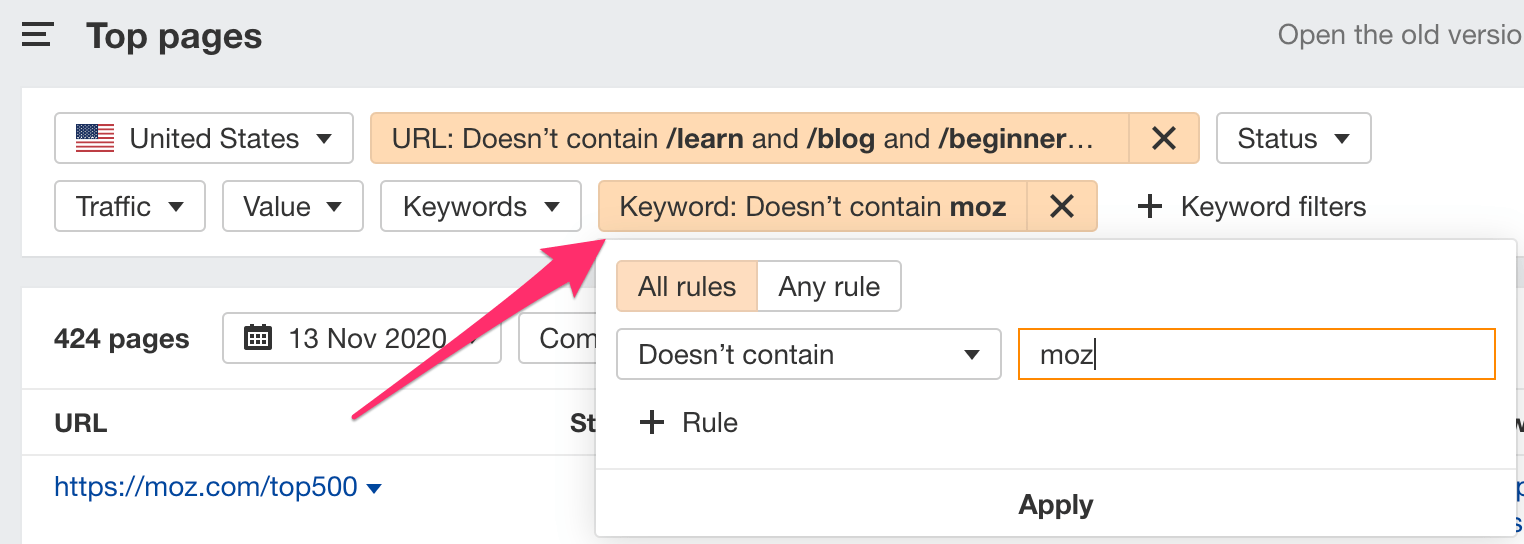
Honorable mention: projects dashboard
Easily monitor key SEO vitals of all your projects (domains, subdomains, clients, etc.) from one simple birds-eye-view dashboard. You can even link your Google Search Console account to Ahrefs and they'll show you data in the dashboard too.

Pricing: starting at $99/month.
Moz

Aside from custom SEO reports (and a list of report templates to choose from), Moz offers one of the most sophisticated and accurate metrics for predicting the likelihood of ranking a specific keyword: Domain Authority (DA). Domain Authority predicts rankability based on the quality and quantity of backlinks pointing to a specific domain.
What we love: Domain Authority (DA) (obviously 😜)
Other tools like Ahrefs and SEMRush provide a similar metric as DA, though not as precise at predicting rankings as Moz’s version (after all, they invented it). Use DA to report on keyword difficulty and to tie link building to a tangible SEO result since acquiring more (and better) backlinks increases DA.

Honorable mention: STAT
STAT is Moz’s rank tracker, and it boasts one of the most consistent, accurate and granular reports on position rankings of any other reporting tool.
Pricing: starting at $99/month (free version).
SEO Reporting tools for local SEO
For businesses with a local presence or agencies who have clients with a local presence.
- SEMRush Local Listings
- Moz Local
- Synup
SEMRush Local Listings

Not only does SEMRush Listings report on local rankings within a specific zip code, local map results (aka Local Pack results), and voice searches with local intent, but it also lets you track and report on reviews across various platforms.
Bonus: aside from great local SEO reporting, this tool also lets you respond to reviews and build and clean citations (NAP) directly from the platform.
What we love: review reports
Reviews play a critical role in local rankings (both organic and Local Pack/Map results). With SEMRush, you can easily monitor your reviews across 70+ directories online. Not only can you report on your star ratings, but you can analyze the sentiment of your reputation.

Honorable mention: citation reports
NAP (name, address, phone number) consistency across online business directories is like a trust signal for Google. The more consistent your business information online, the more Google will trust you are a real business, the higher they will rank you. With SEMRush’s citation tool, you can report on the health of your business information across the web as well as fix it from one seamless dashboard.
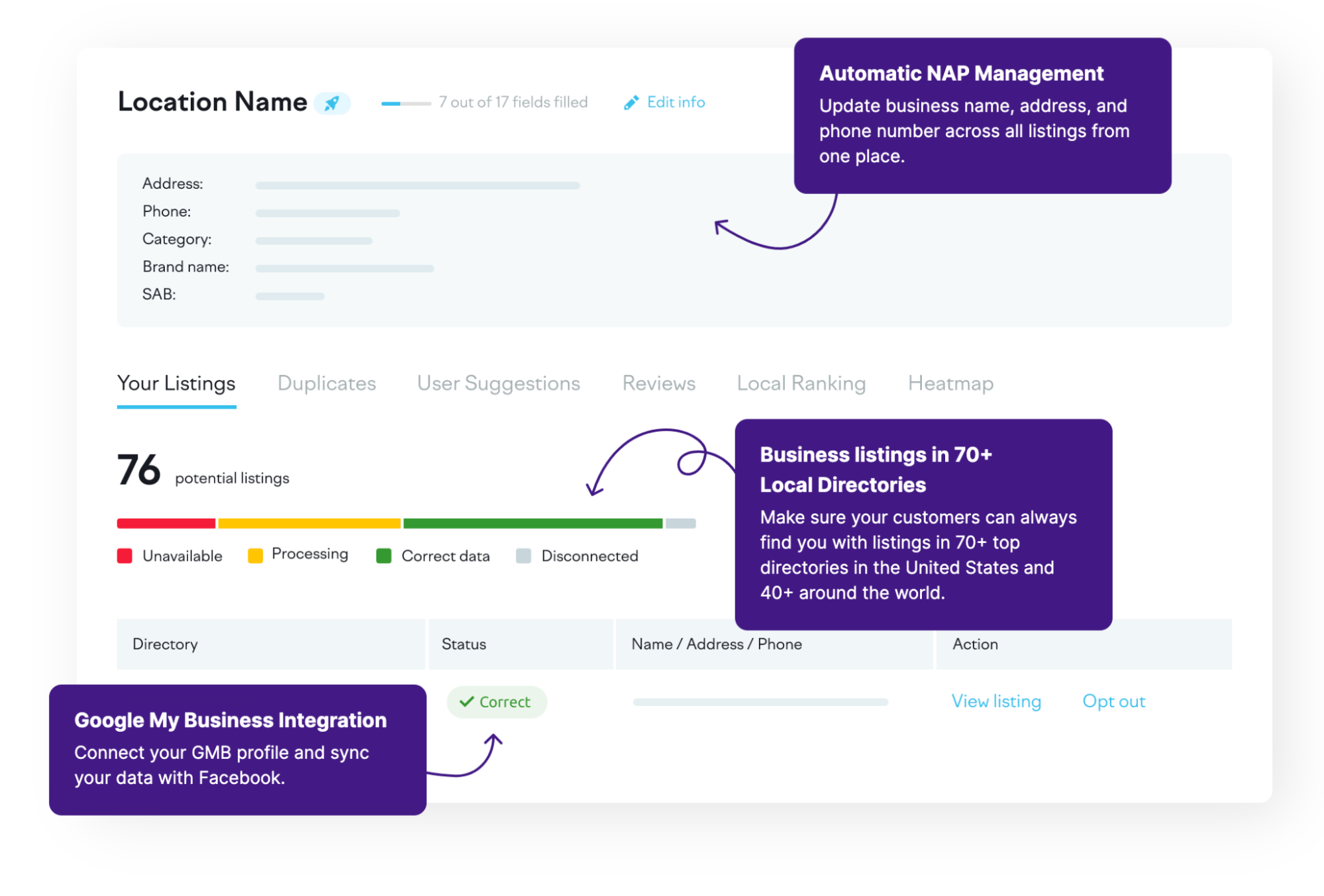
Pricing: starting at $119/month + $40 per location
Moz Local
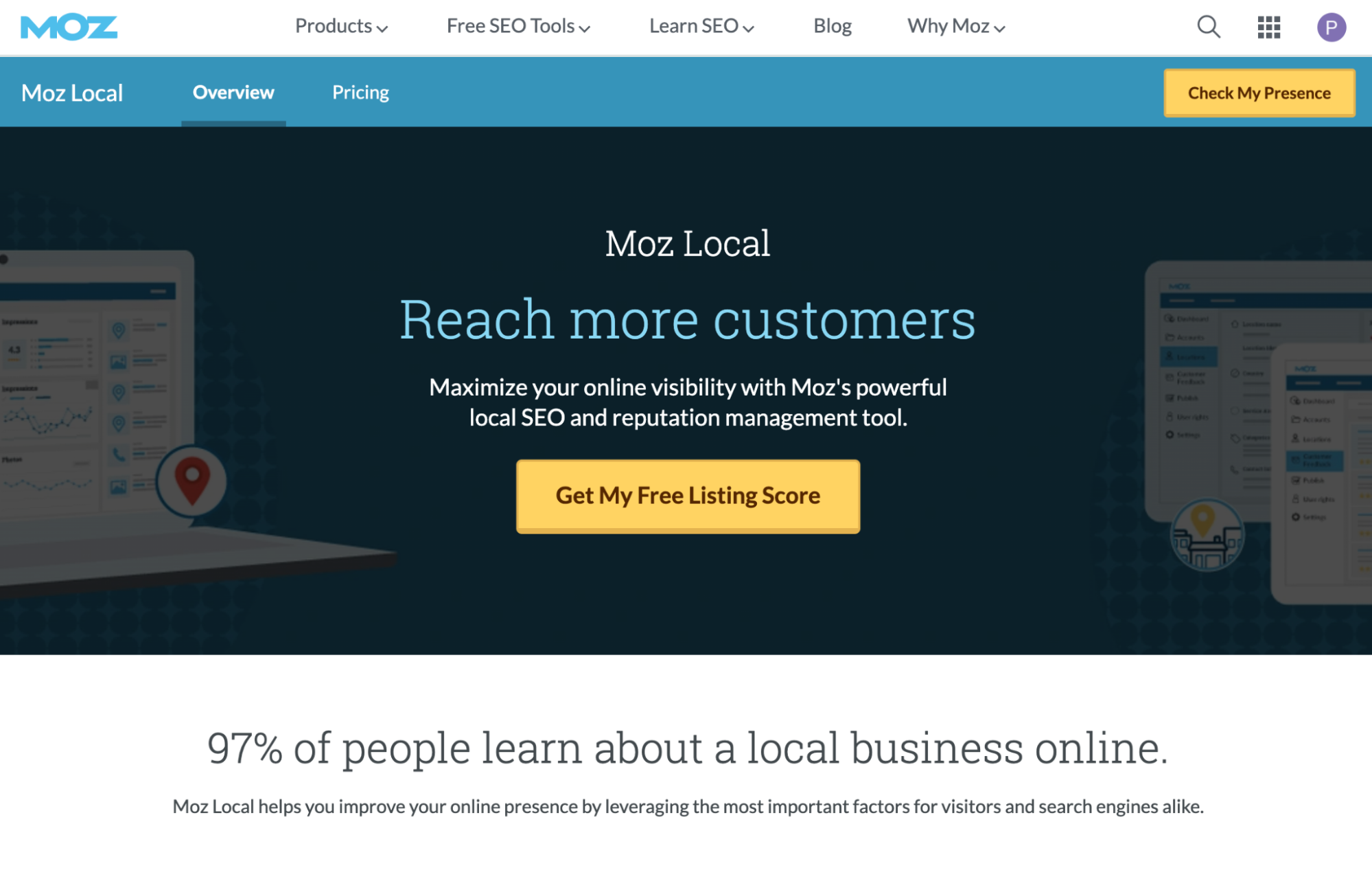
Moz Local was one of the first reputable local SEO reporting tools on the market. Today, it still reigns supreme over many inferior options. Like SEMRush Local, Moz offers business listing management, citation building, review reporting, and sentiment analysis, only for a fraction of the cost.
What we love: activity feed + notification alerts
Reporting requires up to date knowledge. Moz’s activity feed delivers notification alerts about listings, reviews, and other important events, directly to your inbox.

Honorable mention: duplicate reporting
Moz automatically checks for duplicate business directory listings and cleans and removes them so Google doesn’t see multiple instances of different business information online. Then they provide an automated report that tells you how many duplicates they removed.
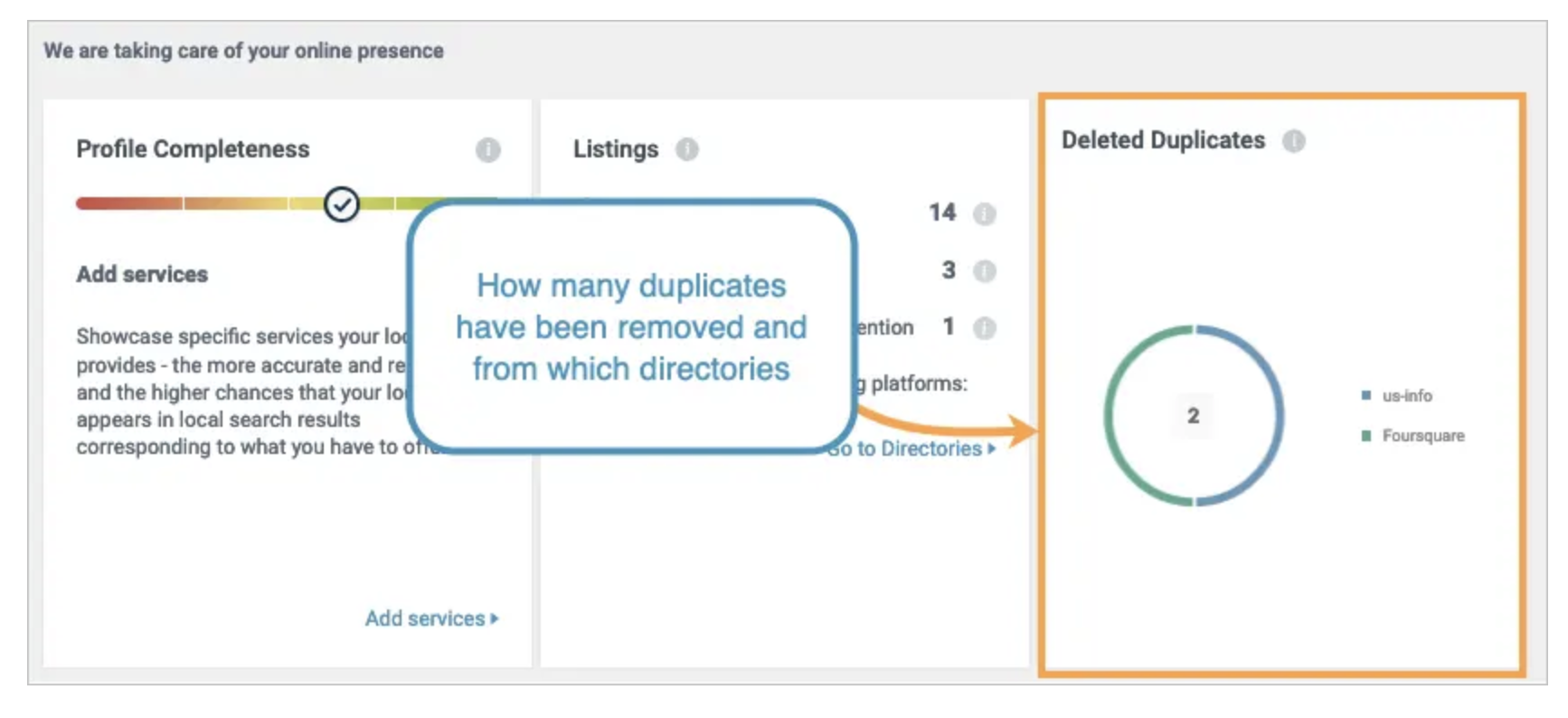
Pricing: starting at $14/month.
Synup

Like the previous two reporting tools, Synup also delivers automated listing management, review monitoring, and analytics.
What we love: enterprise plan
For enterprise local business (i.e. businesses with hundreds of locations across the globe), Synup makes it easy to centralize communication and decentralized individual location management depending on your team needs. Manage hundreds of locations with ease.

Honorable mention: voice search optimizer
How many search queries do voice search assistants like Alexa and Google Home steal? With voice search optimizer, you can sync your business information across the leading voice search assistants currently available.

Pricing: starting at $30/location/month.
SEO reporting tools for aggregating data
For businesses or agencies that want to pull data from various sources into one, seamless, visual dashboard that can easily be shared with colleagues and clients.
- Databox
- Geckoboard
Databox

Instead of logging into multiple data sources or tools, Databox and company present all data in one seamless viewport (with only one login).
What we love: Designer
Designer is Databox’s drag-and-drop custom dashboard design tool that lets you create meaningful visual dashboards in minutes. It also includes 200+ templates to use and edit (like this SEO dashboard).

Honorable mention: live dashboard reporting
Databox lets you combine multiple dashboards into one comprehensive report and share them with colleagues or clients live! That’s right, the dashboard is interactive. Check this live dashboard out below:

Pricing: starting at $71/month (free version available)
geckoboard
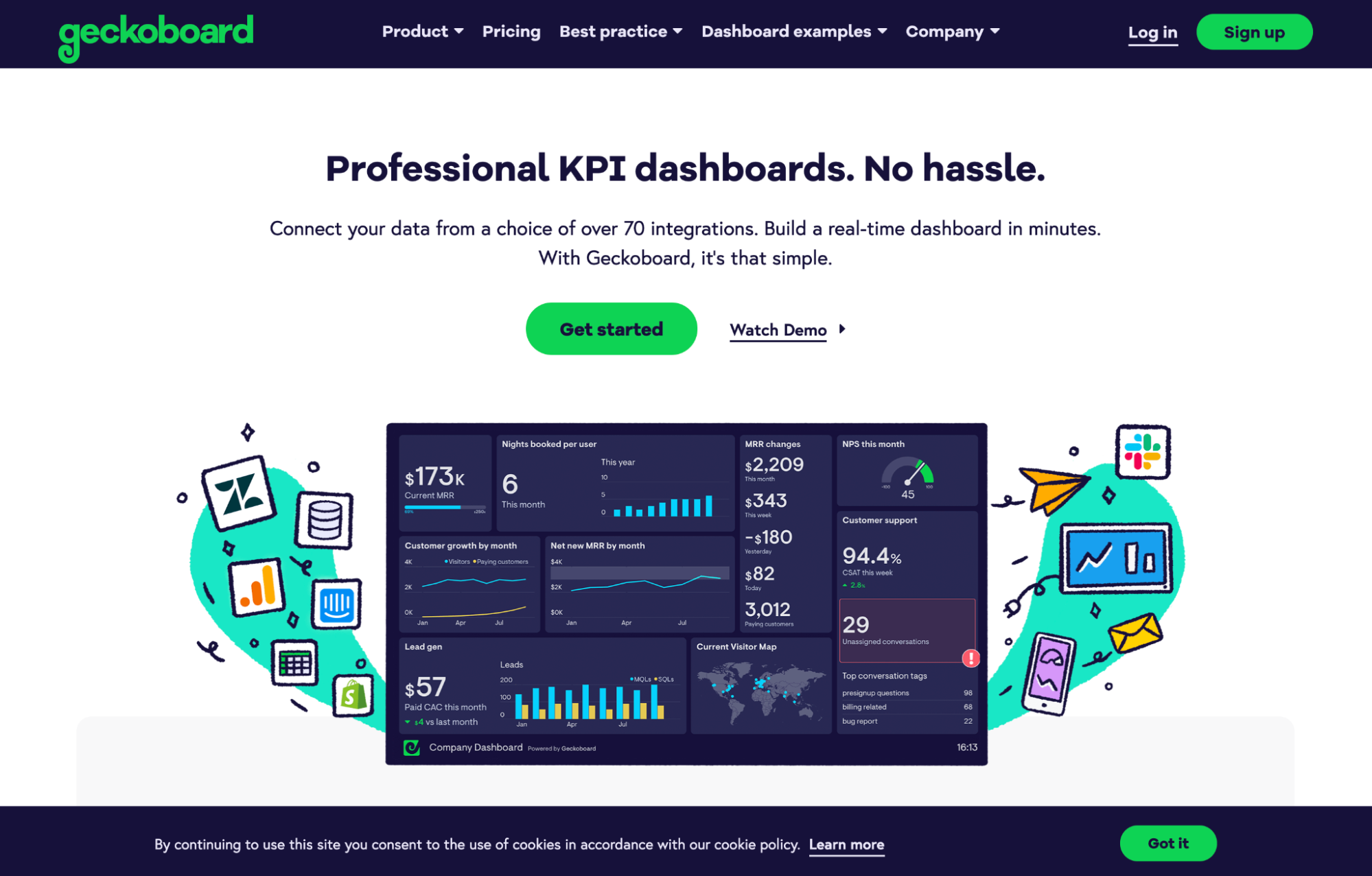
What we love: visualization types
Geckoboard lets you turn data into clear, straight-forward visualization in a few clicks by adjusting the visualization type. Instead of viewing data in the standard visual type your tool provides, geckoboard lets you adjust the visualization type to a pie chart, bar chart, gauge, number widget, column chart, line chart, text widget, list, or leaderboard.

Honorable mention: send to Slack
Automate SEO reports directly to a specific Slack channel so everyone on the team can get a weekly or monthly report. Never get a “I didn’t receive the report” response again.

Pricing: starting at $28/month
Time to pick a tool
Hopefully, this article made one thing clear: the perfect SEO reporting tool depends on your situation, preferences, and needs, not someone else's.
Lucky for you, loads of options exist.
Whichever reporting tool you ultimately decide on, always remember that a report is far more than just a data dump. It serves as a comprehensive analysis of the data at hand, complete with valuable recommendations, actionable items, and concrete goals. This approach ensures that your SEO efforts are not just tracked but actively contribute to your overarching marketing strategy, mitigating issues like duplicate content and enhancing your overall performance.
